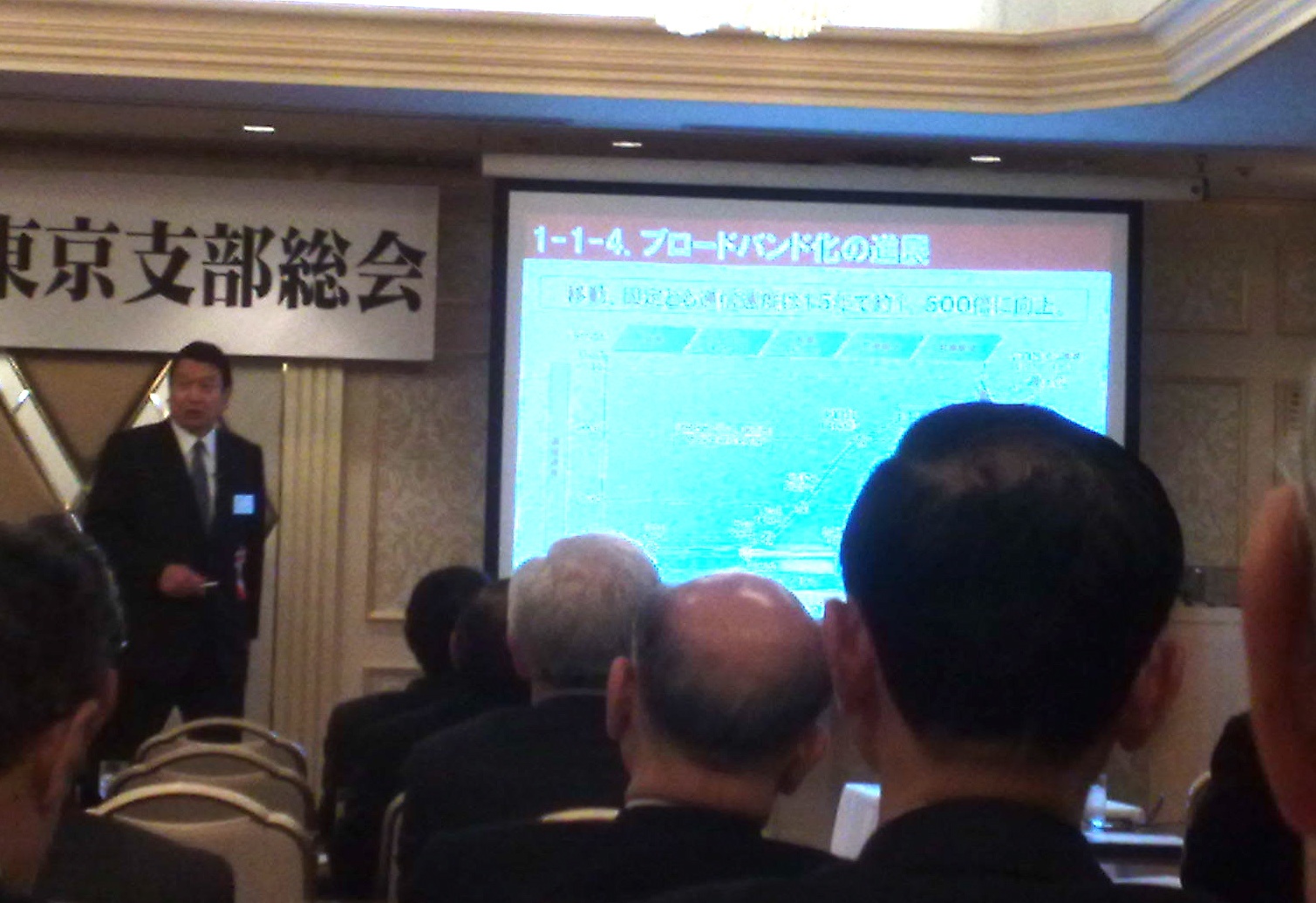日本文が後ろに続きます。
Last night I attended a meeting for alumni of Osaka University, where I graduated, to see the presentation by Ryuji Yamada, President and CEO of NTT DoCoMo, one of Japan’s mobile phone operators. Mr. Yamada is also a graduate from Osaka University and was invited to this meeting as a guest speaker.
He talked to us about NTT DoCoMo’s current circumstances, innovation plans and future strategies. He said in advance that the revenue from voice communications was decreasing year by year and so far the loss was not completely compensated yet by the revenue from packet communications, so innovations in packet communication was important. He also added that one of the important things right now was to change policies so as to meet the current situation where mobile communication market in Japan was reaching its full maturity. He said that he had launched the “All-DoCoMo Reform Plans”, where more than 3000 current problems had been collected from every workplace, ranging from R&D divisions to local shops, and the problems had been dealt with 25 project teams for discussion and improvement. Some of the problems were solved by the plans. One of the solutions is a special assurance plan to dispatch an on-site consultant engineer to the customer who complained of dissatisfied signal reception at home, within 48 hours from the time of this customer’s complaint call.
The most impressive point of his presentation was that mobile devices will be tools for personal activity assistance. Since the first era of them, YOU have done something with them, from voice communications to internet access and electronic wallets. In the future, THEY will do something for you. They will proactively help you do something. One of such solutions already in service is the “i-Concier”, where text messages such as traffic information, weather information, and local event information, are automatically displayed on mobile phone’s screen, according to date, time and phone’s location obtained from antennas communicating with the phone.
Media for information distribution is, according to his speech, shifting from text-based message to motion videos. He said that, as smart phones was being more and more popular, video would be the key media used for not only entertainment but tourist information, online shopping, navigation, security and medical assistance.
For such advanced services by smart phones, high network performance is necessary. Mr. Yamada declared that in December 2010 NTT DoCoMo would launch Long Term Evolution, or LTE, a 3.9-generation mobile telephony service, starting with that for the 2GHz band and to extend to that for the 1.5GHz band, and would offer 3G/LTE-dual handsets next year. With LTE terminals, radiowaves can be used approximately 9 times more efficient than current 3G terminals. That is, you can enjoy 9 times smarter services than today’s phones.
To prevent NTT DoCoMo’s LTE system from making the Galapagos ecosystem, he emphasized that NTT DoCoMo also did international activities more energetically than ever. It founded research and development facilities in Beijing, Europe and the United States, for contribution to standardisation and normalisation in the projects of the 3rd Generation Partnership Project, or 3GPP. At the same time, it’s investing developing countries’ operators like TTSL and TTML in India, in order to help do business with it.
It’s greatly welcomed that mobile services will evolve to be more advanced and attractive for users. My hope is, as written in the last entry, to accept any terminal I want to use, as long as it meets the basic standards.
NTTドコモの山田隆持社長の講演を聞いてきました。山田社長は私の卒業した大学の大先輩ということで、大学のOB会の総会に特別講師として来ていただいたのでした。
OBの総会なんて普段はほとんど人が集まらないんですが、ドコモの社長の講演があるということで今年は例年にない動員数だそうです。
ということで、山田社長にモバイル業界の動向やドコモの今後の取り組みについて熱く語っていただきました。
まず、音声通話の収入は年とともに減少していっているとのことで、それをパケット通信の収入では十分に補いきれていない、だからパケット収入が今後の重要な鍵になるとおっしゃっていました。日本の携帯業界は成熟期に移行しつつあるということで、それに応じた方針転換のための「変革とチャレンジ」に今取り組んでいるそうです。その一環として「全ドコモ改革」プランを立ち上げ、研究開発部門から街のドコモショップの現場に至るまで全職場から3000個の課題を拾い上げ、それを25のプロジェクトに分けて議論・解決に向けて取り組んでいるとのこと。そのうちの1つが「48時間以内の訪問対応」。家の中で電波の入りが悪いなどで苦情を言ってきたお客様のもとへ48時間以内にエンジニアを派遣して対応するといったものです。
一番印象的だったのは、携帯端末はこれから「行動支援」のツールになりつつあるということ。これまでは、通話機能だけからメールができるようになり、ネットにアクセスできるようになり、おさいふケータイが使えるようになっていったりなど、「ケータイで〜ができる」ことを充実させていったんですが、これからは「ケータイが〜してくれる」ツールになるとのこと。その1つの例が「iコンシェル」で、これは端末の日時と位置情報に応じて交通情報や気象情報、近所のイベント情報などが自動的に画面にメッセージとして表示される機能です。
山田社長によると、情報配信はこれから動画にシフトしていくとのこと。スマートフォンがこれから高機能になればなるほど、動画はエンタテインメントのみならず観光情報や通販、ナビ、警備、医療などの分野でキーとなるだろうとおっしゃっていました。
そのために、ネットワークのこれまでの3Gから、2010年12月には3.9GのLTEサービスを2GHz帯から始め、1.5GHz帯に拡大し、さらに3Gとのデュアル端末(電話機)を2011年以降に出すと宣言されました。LTEだと、電波の利用効率が3Gの9倍になるとのことで、つまり今の携帯よりも9倍賢いことができるということです。
ガラパゴス化を避けるため、ドコモは北京と欧州と米国に研究開発拠点を置き、3GPPの標準化、規格化にも精力的に取り組んでいるとのこと。またインドのTTSL社/TTML社に投資をし海外連携も進めているとのことです。
携帯業界の大御所の方も、居並ぶOBを前にしてはすっかり「大阪のおっちゃん」の語り口。まあ魅力的なサービスがどんどん増えてくれるのは利用者としてはありがたい限りですが、前にも書いたように規格に適合している限り使いたい端末は何でも使えるようにしてもらいたいものです。
